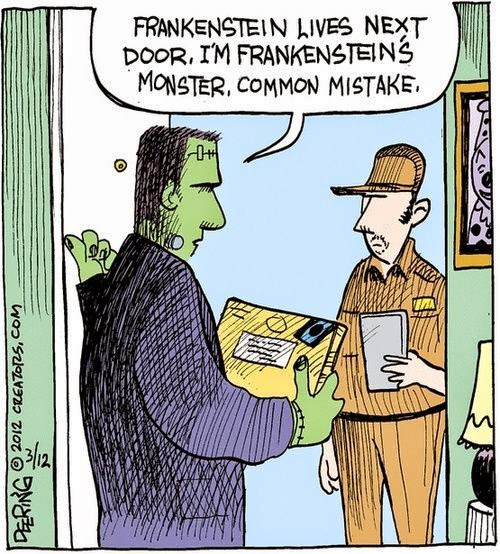6 things you might not know about Frankenstein
6 things you might not know about Frankenstein
Who is Frankenstein?
 If you hear the word, "Frankenstein" and you picture in your mind a green creature with bolts sticking out of his neck, well then you are confusing the monster with his master. In fact, Frankenstein is not a scientist, but a doctor who was obsessed with life and death. The death of his loved ones was the trigger that sparked the interest in giving life into something that was already dead. So I am sorry, but he is not a crazy scientist, although, he fits the archetype: An ambitious man focused on a grand scheme to change the world.
If you hear the word, "Frankenstein" and you picture in your mind a green creature with bolts sticking out of his neck, well then you are confusing the monster with his master. In fact, Frankenstein is not a scientist, but a doctor who was obsessed with life and death. The death of his loved ones was the trigger that sparked the interest in giving life into something that was already dead. So I am sorry, but he is not a crazy scientist, although, he fits the archetype: An ambitious man focused on a grand scheme to change the world.
Who is the Creature?
Now, if you were thinking that you only mistook the names of Frankenstein and the monster, but that the creature still looks the same, well you are wrong yet again. Frankenstein designed the monster to look beautiful. In the book, the doctor states when he looks at the creature:
"His limbs were in proportion, and I had selected his features as beautiful. Beautiful! His yellow skin scarcely covered the work of muscles and arteries beneath; his hair was lustrous black, and flowing; his teeth of a pearly whiteness..."
"His limbs were in proportion, and I had selected his features as beautiful. Beautiful! His yellow skin scarcely covered the work of muscles and arteries beneath; his hair was lustrous black, and flowing; his teeth of a pearly whiteness..."
What about his personality? Is he a dumb monster that kills because it is his first instinct? No, he is actually smart, kind, and if that is not enough, he is vegetarian (Well, he only eats berries for a while). In fact, he fits the archetype of the orphan: someone who is constantly looking for love and approval.
Editions
There is something that the people that read the last versions of the book don't understand: why Frankenstein call his wife, Elizabeth, cousin. In the last versions of the book, the mother finds a poor family who adopted a little girl. Then, she proceeds to adopt her and intends to give her as a gift to his son. And the explanation the book gives of why he calls her cousin is that he loves her as if she was a family member. However, in the first version, Elizabeth is in fact the cousin of Frankenstein and because they love each other so much, they end up marrying.
Theme
Frankenstein is a gothic novel, however, one of its themes is loneliness. Every important character felt isolated at some time in the story. First, the story is narrated by an explorer, Robert Walton, who was writing to his sister because he felt alone. He admitted in a letter he had no friends and that he desired the company of a man who could sympathize with him. Then, Frankenstein felt lonely when he went to study in Ingolstadt to become a doctor. He later felt lonely when he realized that he was the only person who knew the secret to give life and could not tell anyone else. Then, the monster observed an isolated family trying to survive after his creator left him alone. In addition, the monster felt lonely because every person was afraid of him and he asked Frankenstein to build him a wife. Concluding, at the end of the book Frankenstein chases the monster to the north pole, the loneliest place on earth.
Biography/Creation
Frankenstein was created in a contest where each competitor had to create a supernatural story. Mary Shelley, the author of the book, said she got the idea from a dream in which his baby came back to life. In addition, many of the details of the book share similarities with Shelley's life. One example is that Frankenstein's child named William died and the same thing happened to Shelley's newborn baby named William.
Movies
Another thing that people don't know about is that the movies influenced the ideas that people associate with Frankenstein. For example, there was never an explanation of how Frankenstein gave life to the monster and it is the popular belief that he did so by using electricity. Also, there was never an assistant named Igor. All of these things were created by the movies.
If you would like to check out the book I will leave the link here: Frankenstein.
If you would like to check out the book I will leave the link here: Frankenstein.
Feel free to leave comment, questions, concerns, or suggestions.


Comments
Post a Comment